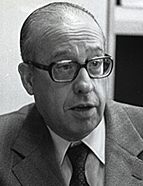

Since his early days as a student, he had been an actively engaged citizen both politically and civically, and it was as a citizen that he continued to intervene, namely when he took part in the authorized Congresso Republicano [Republican Congress] in Aveiro, where he gave a conference which was later published as a book, O Socialismo e o Futuro da Península [Socialism and the Future of the Peninsula]. These may have been years of frustration, of difficulties, but were nevertheless years abundant in personal publications.
France, however, had not forgotten him and the Naval Academy awarded him a major prize in 1970: the publication of his doctoral thesis. In the following year, by recommendation of Albert Silbert and Michel Mollat, he was hired as full professor at Clermont-Ferrand, where he lectured until 1974 and where he was awarded a doctorate honoris causa. These were quiet years in an Auvergne he claimed as his own, while Marcello Caetano’s stale salazarismo rotted, crumbling apart from within. He wrote a critical review of the 1972 education reform – an unequivocal sign of its breakdown - but editorial misfortunes caused it to be published during the 25th of April revolution in 1974. Such misfortunes obviously led to his being appointed Ministro da Educação e Cultura [Ministry for Education and Culture].
Between July and November 1974, he attempted to act on two different fronts: immediate reforms with a view to adapting the ministry and what was left of the education apparatus to the democratic process, and the launch of the foundations for a major structural reform. Five months during which his agenda (for once this was a minister with an agenda!) and his actions – requiring authority and a strong state that did not align with totalitarian or demagogic adventures, where doing would result (in a very Enlightened way) from what had to be done - clashed with an anarchist, opportunistic and pro-communist reality. It was therefore foreseeable that he would slam that door and go home, unemployed once again. He had been a full professor at the Faculdade de Ciências Sociais e Humanas da Universidade Nova de Lisboa [Faculty of Social Sciences and Humanities of the New University of Lisbon] since 1978. He had once again failed in his aim to endow the country with research and an integrated social sciences education, which would articulate history and sociology, economy, geography, anthropology.
